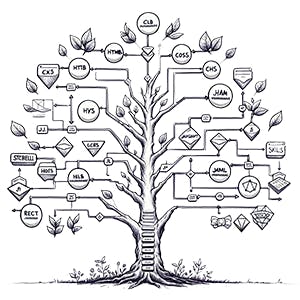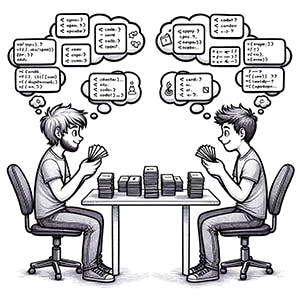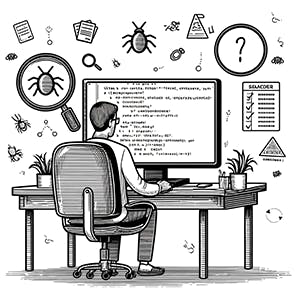🤪 7 Fun Ways to Gamify Your Learning Journey
Because learning to code doesn’t have to be a chore!
We all know learning to code can be an incredibly rewarding journey, but let's be honest - it's not always the most exciting process.
Hours spent pouring over documentation, debugging endless lines of code, and trying to wrap your head around complex concepts can sometimes feel like a slog.
But what if there was something that could make your coding adventures much more fun and engaging?
Let’s talk about gamification! 😃
Gamification is all about taking the principles that make games so captivating - things like challenges, rewards, and a sense of progression - and applying them to everyday tasks and learning experiences.
By incorporating gamification into your coding journey, you can transform the way you approach each new concept, project, and obstacle.
Instead of seeing them as chores, you'll start to see them as opportunities to level up your skills, earn virtual trophies, and indulge your competitive spirit.
Here are 7 fun and effective ways to gamify your coding learning process:
#1 - Personal Milestone Rewards

One of the best ways to gamify your coding journey is to set up a personalised reward system.
Think about it - when was the last time you completed a big coding project or mastered a challenging new concept, and then promptly treated yourself to something special? Probably not often enough, right?
Well, that's all about to change. By establishing specific goals or milestones, and then assigning fun rewards for achieving them, you can create an incredibly motivating feedback loop.
Maybe it's finally finishing that online programming course you've been meaning to complete. Or maybe it's building your first project from scratch, without relying on tutorials.
Whatever your milestones might be, make sure they're measurable and meaningful to you.
And the rewards? The options are endless! It could be as simple as allowing yourself to take the afternoon off, buying that new book or video game you've been eyeing, or indulging in your favourite snack.
The key is to choose rewards that you genuinely get excited about. That way, every time you hit a new milestone, you'll have something to look forward to - a little treat that reminds you just how far you've come.
#2 - Coding Challenge Websites

If you really want to take your coding gamification to the next level, there is a whole world of challenge websites out there.
Places like CodinGame, CodeWars, and LeetCode are absolute goldmines when it comes to turning your learning into a fun, competitive experience.
The premise is simple - these sites offer a huge library of coding challenges, puzzles, and mini-games, all designed to put your programming skills to the test.
But the real magic happens when you dive in and start competing against yourself (and others, if you're feeling brave!).
Each time you complete a challenge, you'll earn points, unlock new levels, and maybe even climb the global leaderboards.
It's a fantastic way to push the boundaries of what you know, tackle problems you wouldn't normally encounter, and get immediate feedback on your progress.
Plus, the gamified design of these platforms makes the whole experience genuinely enjoyable.
Whether you're battling against the clock, facing off against other coders, or simply trying to complete that one pesky challenge that's been stumping you, the thrill of the competition is sure to keep you coming back for more.
#3 - Design Skill Trees for Learning Paths

If you're the type of person who loves a good role-playing game (RPG), then you're going to love this next gamification strategy.
Let’s talk about coding "skill trees" - a visual way to map out your learning journey and track your progress, all while tapping into that addictive RPG feeling.
The basic idea is to create a branching diagram that represents the different areas of coding you want to explore, like front-end development, back-end programming, database management, and so on.
Each branch of the tree becomes a "skill" that you can unlock and level up, with prerequisites and dependencies just like in your favourite RPGs.
For example, to advance your front-end skills, you might need to first master the basics of HTML and CSS.
Once you've completed those "prerequisite" skills, you can then move on to learning JavaScript, and so on.
The beauty of this approach is that it gives you a clear sense of progression and lets you see how all the different coding disciplines fit together.
But the real fun comes in when you start visualising your skill tree and tracking your progress.
Imagine unlocking a new "skill point" every time you complete a coding course or build a project from scratch. Or maybe you can even create little icons or badges to represent the skills you've mastered, just like earning achievements in a game.
The key is to make this skill tree your own - customise it to reflect your unique interests and goals as a coder. That way, every time you level up a skill, you'll get that same sense of accomplishment and motivation that comes from crushing a tough boss battle or unlocking a powerful new ability.
#4 - Coding Journal or Log

Let's be honest - coding can sometimes feel like a real rollercoaster ride, with plenty of ups and downs, breakthroughs and setbacks.
That's why keeping a coding journal or log is such a brilliant way to gamify your learning journey.
By regularly recording your progress, reflections, and achievements, you'll create an awesome personal dashboard that can keep you motivated, focused, and inspired.
Imagine having a digital (or even physical) space where you can jot down your daily coding accomplishments, no matter how big or small.
Maybe you finally mastered that tricky algorithm, or perhaps you just wrote your first lines of clean, well-commented code.
Whatever it is, getting into the habit of celebrating these milestones will do wonders for your confidence and sense of progress.
But a coding journal isn't just about tracking your wins - it's also a place to reflect on the challenges you've faced and the lessons you've learned.
Spend a few minutes each day noting down any roadblocks you encountered, strategies you tried, and insights you gained.
This reflective practice will help you identify patterns, recognise areas for improvement, and adapt your learning approach accordingly.
Whether you opt for a simple text document, a bullet journal, or a dedicated digital app, a coding journal or log is a fantastic way to turn your learning journey into a meaningful, trackable, and thoroughly rewarding experience.
#5 - Timer-Based Challenges

We all know how easy it can be to get distracted or lose focus when you're deep in the coding trenches.
That's where timer-based techniques like the Pomodoro method can be absolute game-changers - and with a little twist, you can turn them into a full-fledged gamification strategy.
The basic premise is simple: you set a timer for a focused work session, typically around 25 minutes, and then take a short break afterwards.
But here's the fun part - instead of just seeing these timer-based sessions as a way to boost your productivity, why not turn them into a points-earning opportunity?
How about this: every time you complete a successful "Pomodoro" or focused coding session, you get to award yourself a set number of points or virtual "coins."
Then, you can use these rewards to treat yourself to something special, like an extended break, a favourite snack, or even unlocking a new level in one of those coding challenge websites we talked about earlier.
The beauty of this approach is that it taps into our natural desire for progress and achievement.
Watching those points or coins add up can be seriously satisfying, and it gives you a tangible sense of accomplishment with each completed session.
Plus, the prospect of "spending" your rewards on breaks or other perks provides an extra layer of motivation to stay on track.
You can get even more creative by adding different "difficulty levels" to your timer-based challenges. Maybe a 30-minute Pomodoro is worth 5 points, while a gruelling 45-minute coding sprint earns you 10.
The key is to experiment and find a system that works best for your individual learning style and preferences.
Once you start gamifying your time management, you'll be amazed at how much more engaged and productive you'll feel during those coding sessions.
#6 - Flashcard Duels

Ever feel like you're stuck in a never-ending loop of memorising syntax, commands, and programming concepts?
Well, one fun solution is "Flashcard Duel" – a simple yet effective gamification technique that's sure to add a healthy dose of competition and excitement to your coding studies.
The premise is straightforward: you create a deck of digital or physical flashcards, each one covering a key programming element or concept that you need to master.
Then, you set a timer and challenge yourself (or a friend!) to see how many of those cards you can correctly answer before the clock runs out.
For every correct answer, you earn points. And the more you practice, the better you'll get – not just at recalling the information, but also at beating your own high scores.
It's a fantastic way to transform dry, repetitive learning into an engaging, almost addictive game.
You can take this flashcard duel concept even further by adding extra layers of gameplay.
Maybe you could introduce "power-ups" that double your points for a certain number of questions, or "boss battles" where you have to answer a series of tricky questions in a row without making a mistake.
The possibilities are endless, and the more you customise the experience, the more fun and rewarding it will be.
#7 - Bug Bounty Hunt

We all know that feeling when you're caught up in a debugging frenzy, staring at a seemingly endless wall of code, trying to track down that pesky bug that's been driving you crazy.
It can be frustrating, exhausting, and sometimes even a little demoralising.
But have you tried turning this process into an exciting, rewarding game?
Welcome to the "Bug Bounty Hunt!”
The concept is simple: for every bug you successfully identify and fix in your code, you get to reward yourself.
It could be something as simple as a quick snack break, a few minutes of stretching, or even unlocking a new level in one of those coding challenge websites we talked about earlier.
The key is to make the "reward" something that genuinely gets you excited and motivated.
You have some more fun and spice it up by adding a bit of extra challenge to the mix. Try setting yourself time limits for your debugging sessions – maybe you only have 30 minutes to track down and squash that bug before the timer runs out.
Or perhaps you can introduce different "difficulty levels" for the bugs you encounter, with harder ones earning you bigger rewards.
The beauty of this "Bug Bounty Hunt" approach is that it transforms problem-solving from a chore into a thrilling, competitive adventure.
Every time you uncover a new bug, it's like you're on the hunt for hidden treasure.
And when you finally crush that sucker and claim your prize, the sense of accomplishment is incredibly rewarding.
Conclusion
Well, there you have it – 7 awesome ways to gamify your coding learning journey!
From personalised milestone rewards to thrilling bug bounty hunts, these strategies are guaranteed to keep you motivated, engaged, and having a blast on your path to programming mastery.
The key is to experiment and find what works best for your individual learning style and preferences.
Don't be afraid to mix and match these techniques, or even come up with your own creative ideas.
The more you can tailor the gamification to your unique needs and interests, the more effective it will be in transforming your coding adventures.
After all, learning to code is an incredible journey – why not make it one you genuinely look forward to each and every day?
From your fellow ever-growing dev,
Cherlock Code
💙 If you liked this article...
I publish a weekly newsletter to a community of ever-growing developers, seeking to improve programming skills and stay on a journey of continuous self-improvement. Focusing on tips for powering up your programming productivity 🚀.
Get more articles like this straight to your inbox.
And stay in touch on 𝕏 @evergrowingdev

And if you're looking for the right tools to build awesome things, check out Devpages.io, an ultimate hub I built with 100s of developer tools and resources 🛠